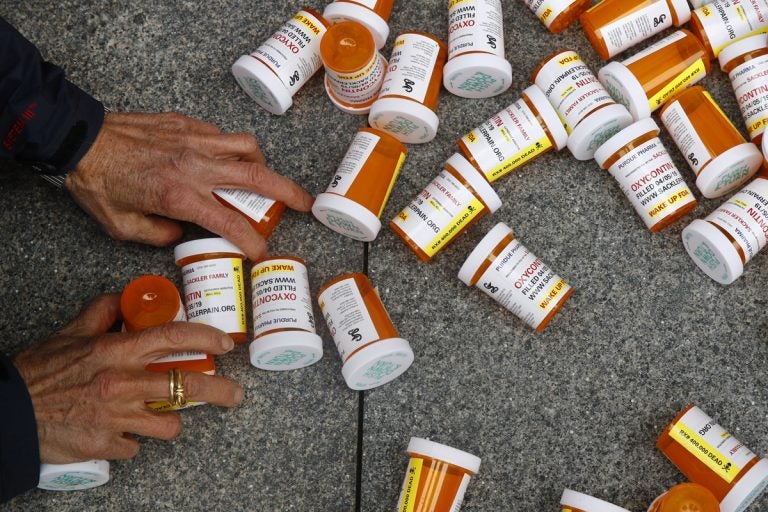Signing three bills, Murphy adds weapons to war against addiction
The new measures boost awareness of opioid misuse, add warning labels on medicine bottles containing opiates, and write MAT into law in New Jersey.

In this Friday, April 5, 2019, file photo, a protester gathers containers that look like OxyContin bottles at an anti-opioid demonstration in front of the U.S. Department of Health and Human Services headquarters in Washington, D.C. (Patrick Semansky/AP Photo)
This article originally appeared on NJ Spotlight.
—
New Jersey will deploy several new tools to help reduce the dangerous impact of addictive prescription drugs and enable healthcare professionals to more quickly treat those who become dependent on heroin and other opioids.
Gov. Phil Murphy signed a trio of addiction-related bills Monday that build on the state’s ongoing efforts to address opioid addiction, which contributed to more than 3,000 deaths in 2018.
One measure promotes awareness and education by designating each October 6 as “Knock Out Opioid Abuse Day,” while another aims to reduce prescription misuse and diversion by requiring pill bottles with opiates to include a clear warning label. Studies have shown that four out of five recent heroin addicts first became addicted to prescription drugs.
The third law prevents insurance companies from forcing Medicaid patients to obtain their permission in advance before receiving medication-assisted treatment (MAT) if it is approved by a doctor or other medical professional.
State officials in April eliminated so-called prior authorization within Medicaid when it came to MAT, considered the gold standard of treatment. Murphy’s action codifies this change in law to ensure it remains in place under future governors. Prior-authorization requirements have become a major concern for healthcare providers. The process absorbs significant time and staff resources and often delays patients’ access to treatment.
‘A devastating impact’
“The opioid crisis has had a devastating impact on our communities, robbing us of too many of our friends, family members, and loved ones,” Murphy said. “This legislation continues our work to combat the opioid crisis by ensuring that there are warning labels outlining the risk of opioid medications, expanding access to the treatment that so many need, and raising awareness of just how easy it is to become addicted to opioids.”
New Jersey has made significant progress in raising awareness about the deadly potential of addiction and decreasing access to prescription opiates, with strict limits on how many pills prescribers can give new patients and emergency-room efforts to avoid pain medications whenever possible. Overall, the use of these prescriptions has dropped by double digits in recent years.
But opioid-related deaths continue to escalate, in part due to growing use of fentanyl, a synthetic opiate that is dozens of times stronger than heroin. New Jersey’s heroin-related death rate of 8.3 per 100,000 is twice the national average, according to lawmakers. And for many of the tens of thousands of patients who seek treatment each year, accessing quality care is a serious challenge.
“The opioid crisis affects every person in this state and must be faced head on,” said Sen. Loretta Weinberg (D-Bergen), who sponsored the Knock Out Opioid Abuse Day bill, which calls on state officials to work with local leaders and community groups to raise awareness about addiction, as well as the connection between prescription drugs and heroin. “We have to address the crisis at every level and on all fronts if we are going to genuinely see opioid abuse be reduced,” she said.
Warning labels
Sen. Joseph Lagana (D-Passaic), one of the sponsors on the warning-label bill, said flagging addictive prescriptions visually is also important. The law calls for the state Department of Health and the Department of Law and Public Safety to work together to decide on the language and placement of warning labels, which pharmacies would then need to affix to bottles containing opiates. The law takes effect after six months.
“We will now be able to warn people of the horrible dangers of taking opioids on the prescription bottles,” Lagana said. “People have a right to know if they ingest a potentially dangerous substance.”
Efforts to expand access to MAT — which usually involves a specially formulated opioid that blocks cravings and addictive behavior, but doesn’t make the patient high — have also blossomed under Murphy, who has invested $100 million annually in various addiction prevention and treatment programs. Treatment providers have lamented the lack of available caregivers to meet the tremendous patient need.
The Department of Human Services, which oversees addiction programs, has trained more than 300 doctors in the practice. The DHS has authorized the use of one form of MAT for paramedics in an effort to connect addicts with treatment even before they come to a hospital or clinic. “I am delighted that the governor and Legislature continue to provide us important tools to combat the opioid epidemic,” said DHS commissioner Carole Johnson.
Johnson also praised the governor’s decision to codify the DHS’s policy to eliminate prior authorization for MAT for the state’s 1.7 million Medicaid members; the measure takes effect in three months. “We are glad to see this smart step to help ensure that our actions cannot readily be reversed by future administrations,” she said.
Assembly Members Louis Greenwald (D-Camden) and Valerie Vainieri Huttle (D-Bergen), sponsors of the bill to eliminate prior authorization, underscored the importance of getting patients into treatment quickly. They noted that additional insurance requirements only cause delays, an outcome that can allow the disease to escalate or become deadly.
MAT “can make the difference in the early, critical stages of breaking addiction and allowing those in treatment to enter recovery. It can ease suffering and save lives, and I am glad to see this signed into law today,” added sponsor and Senate health committee chairman Joe Vitale (D-Middlesex).
WHYY is your source for fact-based, in-depth journalism and information. As a nonprofit organization, we rely on financial support from readers like you. Please give today.




